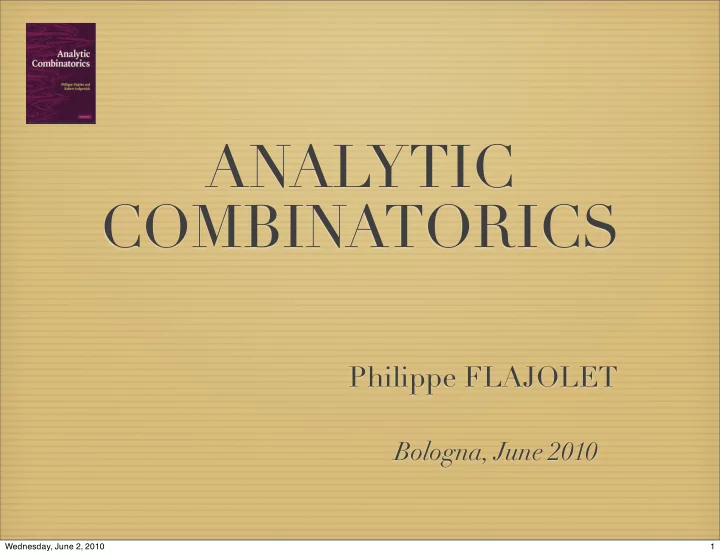

ANALYTIC COMBINATORICS Philippe FLAJOLET Bologna, June 2010 Wednesday, June 2, 2010 1
Counting... Wednesday, June 2, 2010 2
Counting (and asymptotics) Binary trees => Catalan numbers Formula is Growth rate is ( asymptotics ) Wednesday, June 2, 2010 3
Counting (and probabilities) plane tree increasing tree Wednesday, June 2, 2010 4
Counting (methods) E.g. binary trees: 1,1,2,5,14,42,... Bijective combinatorics = first principles Generating function methods ... Algebraic methods (e.g., symmetric fns, operator) Wednesday, June 2, 2010 5
Generating Functions (GFs) Combinatorial class C ; counting sequence ( C n ): � C ( z ) = C n z n (OGF) = C ⇒ z n ˆ � C ( z ) = (EGF) C n n ! Get GFs combinatorics � algebra of special fns Look at GFs as mappings of complex plane, z ∈ C algebra of special fns � complex analysis For parameters, add extra variables complex analysis � perturbation theory 1 / 1 Wednesday, June 2, 2010 6
A Calculus of Discrete Structures Discrete Continuous (a digital tree aka trie of size 500) (a generating function in the complex plane) Wednesday, June 2, 2010 7
FREE algo.inria.fr/flajolet Wednesday, June 2, 2010 8
Analytic Combinatorics A . Combinatorial structures B . Analytic structures C . Randomness properties for objects given by constructions Wednesday, June 2, 2010 9
Quotations (1) Laplace discovered the remarkable correspondence between set theoretic operations and operations on formal power series and put it to great use to solve a variety of combinatorial problems.— G.–C. ROTA La méthode des fonctions génératrices, qui a exercé ses ravages pendant un siècle, est tombée en désuétude... — Claude BERGE Wednesday, June 2, 2010 10
Quotations (2) Despite all appearances they [generating functions] belong to algebra and not to analysis. Combinatorialists use recurrence, generating functions, and such transformations as the Vandermonde convolution; others to my horror, use contour integrals, differential equations, and other resources of mathematical analysis. — John RIORDAN Wednesday, June 2, 2010 11
PART I Symbolic Methods *1. Unlabelled structures & OGFs * 2. Labelled structures and EGFs * 3. Parameters and multivariate GFs Embed a fragment of set theory into a language of constructions; map to algebra(s) of special functions. Wednesday, June 2, 2010 12
Chapter I Unlabelled structures and OGFs Wednesday, June 2, 2010 13
Symbolic Methods Embed a fragment of set theory into a language of constructions; map combinatorics to algebra(s) of special functions. Wednesday, June 2, 2010 14
Wednesday, June 2, 2010 15
Wednesday, June 2, 2010 16
Wednesday, June 2, 2010 17
Wednesday, June 2, 2010 18
Outline Wednesday, June 2, 2010 19
Wednesday, June 2, 2010 20
Wednesday, June 2, 2010 21
Wednesday, June 2, 2010 22
Summary: Wednesday, June 2, 2010 23
Wednesday, June 2, 2010 24
Roots... A modicum of Pólya theory (1937) Schützenberger: languages and GFs (~1960) Rota-Stanley = MIT School (1970s) Goulden-Jackson = constructions (~1980) Joyal’s theory of species +BLL (1980s) Wednesday, June 2, 2010 25
Wednesday, June 2, 2010 26
Catalan numbers again! Wednesday, June 2, 2010 27
Wednesday, June 2, 2010 28
Wednesday, June 2, 2010 29
Wednesday, June 2, 2010 30
Wednesday, June 2, 2010 31
A variety of classes => a variety of “special functions” Wednesday, June 2, 2010 32
Algebraic functions (1) Arise from specifications (CF grammars), with +, x, Seq Elimination : system -> single equation P(x,y)=0 Coefficients are “ combinatorial sums ” [e.g., Sokal, SLC 2009] Wednesday, June 2, 2010 33
Algebraic functions (2) MAPS : Tutte’s quadratic method; cf Cori, Bousquet-Mélou et al., Bordeaux School... EXCURSIONS: the kernel method; cf Lalley 1993, Banderier-F 2001, MBM Wednesday, June 2, 2010 34
Chapter 2 Labelled structures and EGFs Wednesday, June 2, 2010 35
Wednesday, June 2, 2010 36
Wednesday, June 2, 2010 37
Wednesday, June 2, 2010 38
Wednesday, June 2, 2010 39
Wednesday, June 2, 2010 40
Wednesday, June 2, 2010 41
Wednesday, June 2, 2010 42
(End of proof of Theorem) Wednesday, June 2, 2010 43
Wednesday, June 2, 2010 44
Wednesday, June 2, 2010 45
Wednesday, June 2, 2010 46
Wednesday, June 2, 2010 47
Wednesday, June 2, 2010 48
Wednesday, June 2, 2010 49
Wednesday, June 2, 2010 50
labelled Wednesday, June 2, 2010 51
Chapter 3. Parameters and Multivariate GFs runs in perms Wednesday, June 2, 2010 52
Wednesday, June 2, 2010 53
Wednesday, June 2, 2010 54
Wednesday, June 2, 2010 55
PRINCIPLE: Add variables marking parameters at appropriate places and recycle: Wednesday, June 2, 2010 56
Conclusions (Part I) [Chapter 3]: Multivariate GFs give access to parameters; those that can be obtained by “marking” in combinatorial constructions. [Chapters 1-2-3]: Exploit all this asymptotically? counting; mean, variance, distribution ? Wednesday, June 2, 2010 57
Recommend
More recommend